Solar irrigation promises to cut diesel use by 10 lakh tonnes a year

Introducing solar irrigation pump (SIP) systems will gradually enable Bangladesh to cut consumption of diesel fuel by 10 lakh tonnes annually, according to a proposed road map by the Asian Development Bank (ADB).
SIPs will also help reduce emissions of 30 lakh tonnes of carbon dioxide equivalent per year, the ADB said in its proposed road map released in December, titled "Road Map To Scale Up Solar Irrigation Pumps In Bangladesh (2023–2031)".
Around 12.2 lakh diesel pumps and more than 4.3 lakh electric pumps are used for irrigation in the nation, which accounts for 43 percent of total agricultural costs in Bangladesh, according to the ADB.
Replacing diesel pumps with modern and efficient SIP systems will enable a transition to clean energy and reduce dependency on imported diesel.
According to the road map, installing up to 45,000 SIP systems with pump ratings from 4 kilowatts (kW) to 25 kW will add up to 1,000-megawatt peak (MWp) of solar capacity to the country, irrigating up to 4 lakh hectares of land and serving more than 13 lakh farmers.
The suggested breakdown per SIP system is 15,000 solar low-lift pumps for surface water irrigation, 2,000 solar deep tube wells, and 28,000 shallow tube wells for groundwater irrigation.
This will provide 480 gigawatt-hours (GWh) of electricity to the grid per year, almost one percent of total electricity generated now.
According to studies conducted by the Power Division of the Ministry of Power, Energy and Mineral Resources in 2021, factors such as load flow, voltage stability, frequency response, and angular stability for 10 percent and 25 percent integration of variable renewable energy (VRE), such as solar and wind energy, do not negatively affect the grid.
The road map proposes the integration of much lower shares of VRE, so it does not represent any significant risk to the stability of the grid, the ADB said.
The proposed SIP target is significantly more ambitious than interventions foreseen in the agriculture sector by Bangladesh's Nationally Determined Contribution.
And it may require support from the ADB, World Bank, and other international agencies to raise the estimated financing of $800 million in a mix of loans and grants, it said.
The ADB said it has provided $42.4 million to support the Bangladesh government's efforts to convert existing diesel pumps to solar photovoltaic irrigation pumps, of which $20.244 million is a grant from the "Scaling-Up of Renewable Energy Program".
This programme suggested a structured long-term approach.
So, the Sustainable and Renewable Energy Development Authority should coordinate with the Bangladesh Agriculture Development Corporation, Barind Multipurpose Development Authority, and Bangladesh Water Development Board and others to align implementation efforts.
Kenichi Yokoyama, director general of South Asia Department at ADB, said this road map outlines strategic actions, policy interventions, and stakeholder collaborations required for a successful transition, setting the stage for a sustainable future.
"The road map incorporates inputs from a diverse set of experts to guide Bangladesh in adopting SIPs that will to improve the agriculture sector's performance, and address water and energy challenges to improve livelihoods."
Yokoyama stated that the implementation of the road map would help Bangladesh achieve a sustainable and secure source for irrigation.
"It serves as a guide and a call to action for promoting a greener and more prosperous Bangladesh. A resilient and inclusive future is possible with solar energy and sustainable agriculture playing a key role."
The ADB has been supporting Bangladesh's development since 1973 with cumulative commitments of $33.66 billion as of the end of December 2022, Yokoyama mentioned.

 For all latest news, follow The Daily Star's Google News channel.
For all latest news, follow The Daily Star's Google News channel. 








Comments